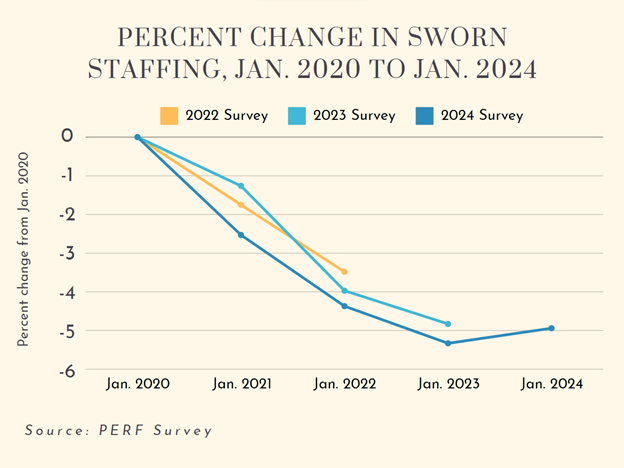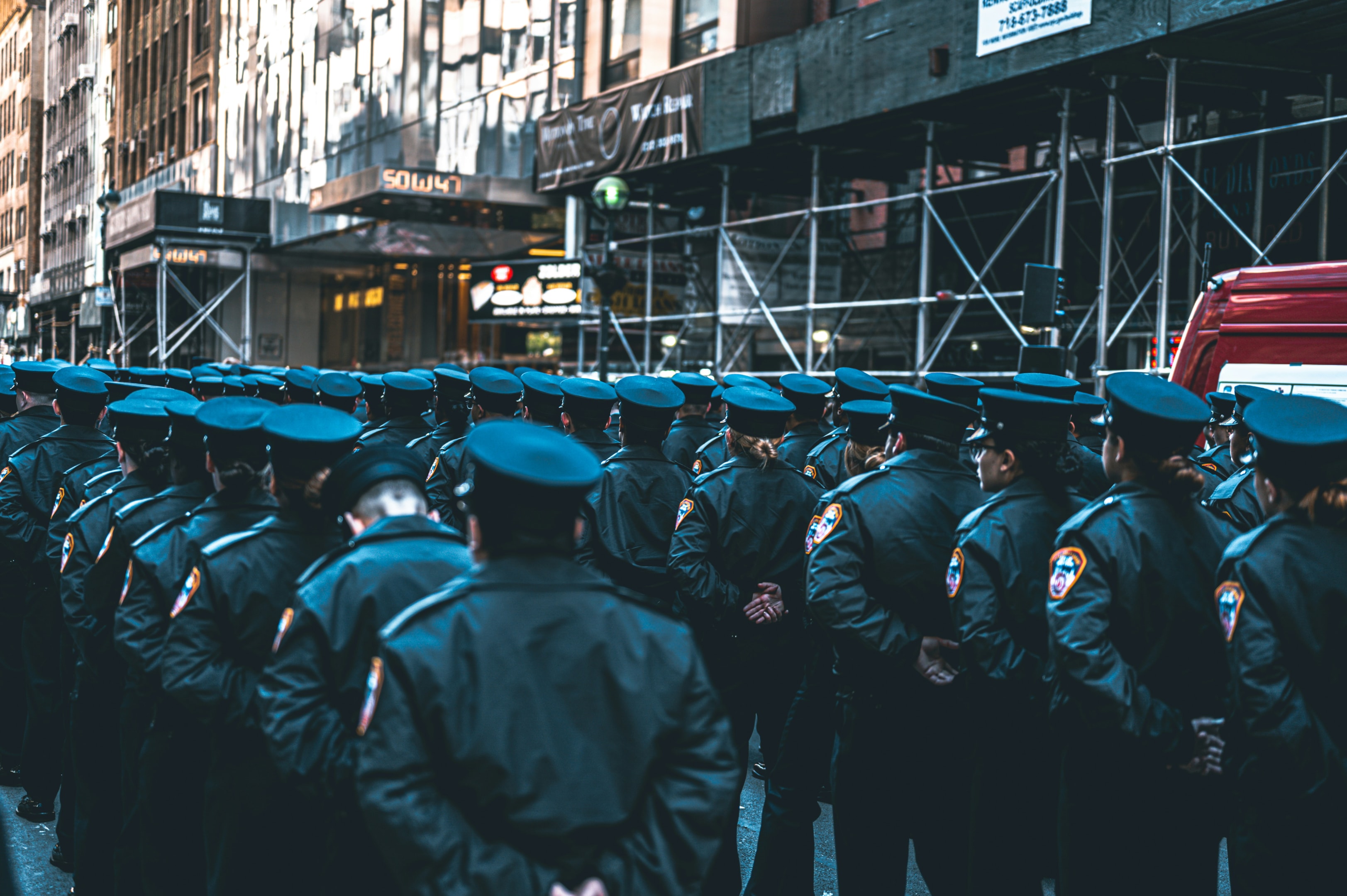Leadership in policing as an organisation stands at a crossroads. In 2025, law enforcement agencies are grappling with mounting challenges—persistent staffing shortages, shifting public expectations, and the growing demand for accountability.
According to the Police Executive Research Forum, large agencies remain more than 5% below their January 2020 sworn staffing levels, impacting their ability to provide essential services.

Meanwhile, a Gallup Poll shows public confidence in the police rose to 51% in 2024, the highest among 17 U.S. institutions. Still, fractured trust in many communities signals a deeper issue: this isn’t just about staffing—it’s about leadership.

Exceptional leadership isn’t about filling roles—it’s about developing emotionally intelligent, ethically grounded leaders who can inspire their teams, adapt in complexity, and rebuild public trust. Leadership development is the engine that transforms these challenges into meaningful reform—and lasting resilience.
Why Leadership Development Is Essential for Law Enforcement Agencies

Enhancing Officer Retention
Officer burnout continues to rise as the profession’s demands intensify. Long hours, low morale, and increasing exposure to criticism contribute to high attrition rates.
The National Command & Staff College (NCSC) focuses on enhancing leadership capacity, well-being, morale, productivity, and team-building skills to improve officer retention (NCSC).
Research published in the FBI’s Law Enforcement Bulletin supports this approach, noting that theoretical leadership training contributes to a healthier work culture, reduced misconduct, and improved morale (FBI LEB).
Reducing Citizen Complaints
Procedural justice training has been associated with reductions in citizen complaints and use-of-force incidents. A peer-reviewed study published in the Proceedings of the National Academy of Sciences found that procedural justice training led to a 10% reduction in citizen complaints and a 6.4% decrease in use-of-force incidents over two years (PNAS, 2020).
Further support comes from a randomised controlled trial conducted by the National Policing Institute, showing improved community perceptions and reduced arrest rates following such training (Policing Institute).
A peer-reviewed study published in the Proceedings of the National Academy of Sciences found that procedural justice training led to a 10% reduction in citizen complaints and a 6.4% decrease in use-of-force incidents over two years (PNAS, 2020).
Further validation comes from a randomised controlled trial conducted by the National Policing Institute, which revealed that procedural justice training improved community perceptions and reduced arrest rates in high-crime areas (Policing Institute).
Promoting Ethical, Adaptive Decision-Making
At the FBI National Academy, law enforcement professionals are trained in real-world leadership. The curriculum combines emotional intelligence with high-stakes decision-making and crisis communication.
Chief Kevin Brooks, an Academy graduate, noted: “It’s not just about managing operations—it’s about managing people, stress, and responsibility under the weight of national attention.”
According to the FBI’s Law Enforcement Bulletin, leadership training also fosters improved team cohesion and communication, resulting in greater organisational efficiency and reduced conflict (FBI LEB).
Prominent Leadership Training Programs for Law Enforcement Executives

Location: Quantico, Virginia
Duration: 10 weeks
Who It’s For: Mid-career officers on track for senior command
This program combines classroom theory, tactical simulations, and physical challenges to prepare leaders for community outreach and high-risk operations.
Audience: Executives from large agencies
Hosted by: FBI Training Division
NEI focuses on strategic foresight, innovation, and inter-agency leadership. Notable alums include executives who have led regional initiatives on cybersecurity and joint operations during public health crises. The National Executive Institute is designed to provide leadership development for executives of the largest law enforcement agencies.
Format: Year-long mentorship and project-based learning
Hosted by the FBI’s Center for Police Leadership & Ethics, the program supports participants as they tackle real-world issues such as rewriting use-of-force protocols, launching peer intervention programs, or modernising recruitment strategies. The National Command Course fills a void in FBI strategic leadership training for policing executives.
Audience: Chiefs of small to mid-sized departments
Duration: 1 week
LEEDS is tailored to help leaders from resource-constrained departments improve fiscal leadership, operational efficiency, and staff development—without requiring months away from duty. The benefits of leadership training include increased self-awareness of strengths and weaknesses through individualised feedback.
Audience: European law enforcement professionals
Delivery: Online and residential
CEPOL provides cross-border training on leadership, terrorism, trafficking, and intercultural management, building capability for leaders operating in multinational environments.
Audience: Canadian senior officers
Focus: Executive development and advanced investigations
CPC offers courses focused on cross-cultural communication, Indigenous community engagement, and crisis command. It serves as a model for nations seeking to integrate equity and cultural competence into leadership pathways.
What Makes a Leadership Development Program Effective?

Behavioral Science First
Top programs integrate stress management, emotional intelligence, and mental wellness frameworks to build durable, ethical leaders. NCSC’s curriculum is anchored in the work of Dr. Kevin Gilmartin, promoting sustainable leadership under pressure. The National Command & Staff College prepares law enforcement leaders to succeed in an ever-changing professional environment.
Learn by Doing
Immersive simulation programs, such as the Tennessee State VR Training Lab, report measurable improvements. Research from Arizona State University indicates that officers trained in use-of-force decision-making through virtual reality exhibited a 48% reduction in the use of force during simulated scenarios, in contrast to those who underwent standard training.
Feedback That Sticks
360-degree feedback systems, such as those used in INTERPOL’s I-Balance, allow participants to improve blind spots through honest input from peers, subordinates, and community partners.
Built Around Your Agency
Custom-built programs offer maximum relevance. The Los Angeles Police Department, for example, partnered with NCSC to develop a diversity-focused leadership series addressing local demographics and systemic gaps.
Formats for Law Enforcement Leadership Training (with Cost Insights)
Format | Best For | Example Program | Highlights | Cost Consideration |
In-Person Immersion | Senior transformation, strategic reset | Networking, simulations, leadership labs | Higher cost, includes travel/lodging | |
Hybrid Cohorts | Career growth without field interruption | Flexibility + peer support | Moderate, scalable for mid-size teams | |
Self-Paced Digital | Upskilling at scale | 24/7 content, global applicability | Low-cost, ideal for budget-conscious | |
VR Simulation-Based | Tactical, high-stress scenario judgment | Measurable results, immersive experience | Mid-range; upfront tech investment |
Empowering Women and Underrepresented Groups

Despite making up 13% of law enforcement personnel, women account for just 3% of senior leadership. Minority representation also remains below national averages in top command roles. Leadership programs tailored to these gaps are helping reshape the future.
INTERPOL’s I-Balance
INTERPOL’s I-Balance program is designed to support the development of women leaders in Southeast Asia’s law enforcement agencies. The initiative focuses on enhancing leadership skills, identifying challenges unique to women in policing, and fostering a network of female leaders across the ASEAN region. Interpol
Illinois Leadership Fellows Program
The Illinois Leadership Fellows Program aims to cultivate leadership skills among diverse professionals. While internal metrics are not publicly available, the program prioritises diversity and inclusion as key outcomes in participant development.
Long-Term Benefits of Leadership Training

Retention: Agencies using structured programs report increased morale and reduced turnover.
Innovation: The Pasadena Police Department adopted AI technologies to enhance operational efficiency and transparency (Veritone).
Trust: Procedural justice training has been associated with a 10% drop in citizen complaints and a 6.4% decrease in use-of-force incidents over time.
Succession: Leadership pipelines built through training ensure stability during transitions.
Frequently Asked Questions (FAQ)
What is the FBI National Academy?
The FBI National Academy is a prestigious 10-week program for mid-career law enforcement professionals in Quantico, Virginia. It combines academic instruction, tactical simulations, and fitness training to prepare leaders for senior command roles (FBI.gov). The FBI National Academy trains law enforcement managers to improve the administration of justice in police departments and agencies. The FBI’s Training Division operates the FBI Academy to be a premier learning and research center for law enforcement.
How does leadership training improve officer retention?
Leadership training improves retention by promoting wellness, effective communication, and inclusive leadership. Officers are more likely to succeed in agencies where they feel supported, respected, and led with integrity.
Are there leadership programs specifically for small departments?
Yes. The Law Enforcement Executive Development Seminar (LEEDS) is designed for chiefs and executive staff from small- to midsize agencies. It includes modules on succession planning, budgeting, and regional collaboration (FBI LEEDS). LEEDS trains domestic and international law enforcement leaders through a professional course of study.
Lorem ipsum dolor sit amet, consectetur adipiscing elit. Ut elit tellus, luctus nec ullamcorper mattis, pulvinar dapibus leo.
Can leadership training reduce citizen complaints?
Yes. A study published in PNAS found that procedural justice training significantly reduced citizen complaints and rule violations, highlighting the impact of ethical leadership on public trust (PNAS).
What leadership training options exist for women in law enforcement?
Programs like INTERPOL’s I-Balance offer mentorship, visibility coaching, and skill development tailored to women in policing. Other fellowships, such as the Illinois Leadership Fellows Program, actively reserve training slots for women and minority leaders.
Is virtual leadership training as effective as in-person training?
Virtual and hybrid models provide flexible, scalable training for various agency sizes and schedules. While immersive in-person programs offer hands-on benefits, many self-paced and virtual options—like the INTERPOL Virtual Academy—offer strong foundational and advanced learning outcomes. Many leadership training programs offer both in-person and virtual formats for participants.
How do agencies choose the right leadership training format?
Agencies should consider their size, operational tempo, leadership goals, and budget. In-person immersion works well for top-tier leaders, while hybrid or self-paced formats serve broader teams without disrupting daily operations.
Does leadership training include succession planning?
Yes. Many programs include modules on identifying and developing future leaders. Succession planning ensures continuity during transitions and reduces organisational disruption.
Conclusion

In a rapidly evolving policing environment, leadership training plays a central role in ensuring agencies remain effective, resilient, and trusted. Programs like the FBI National Academy, NCSC Leadership Labs, and INTERPOL Virtual Academy prepare law enforcement professionals to meet modern challenges with confidence and accountability.
Agencies prioritising leadership development are better equipped to retain talent, build public trust, and navigate the future of public safety.

A trailblazer in humanising leadership and building high-resilience teams. As a former United Nations Peacekeeper, he leverages his high-stakes experience to redefine leadership dynamics. With a career distinguished by numerous accolades, Joseph now helps organizations thrive through a human-centric approach, enhancing performance, productivity, and workplace culture.







